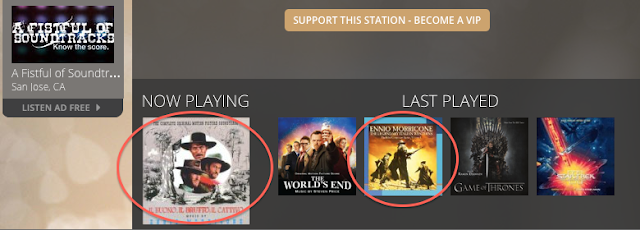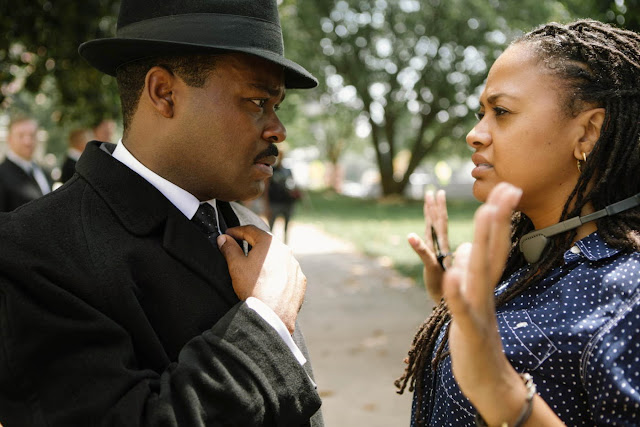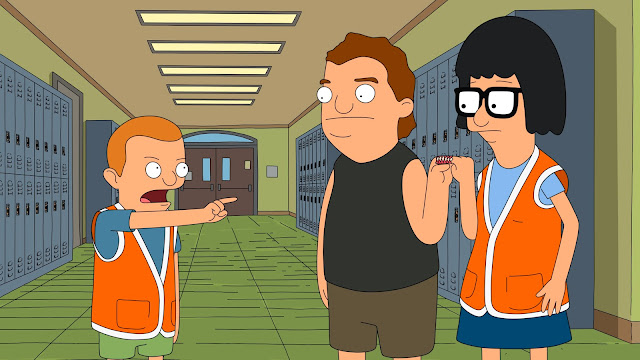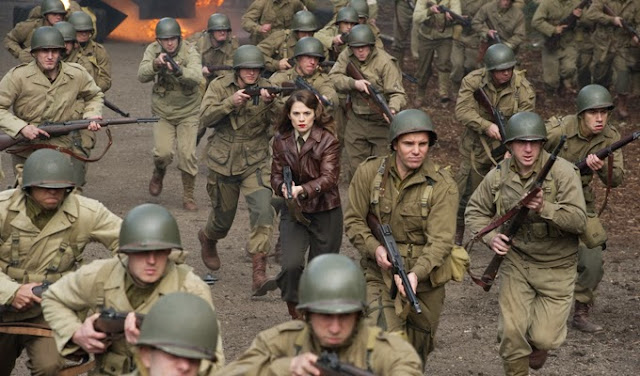On some Fridays, I discuss the week's best first-run animated series episode I saw. It's the "Brokedown Merry-Go-Round" Show of the Week. "Brokedown Merry-Go-Round," a two-hour block of original score tracks from animated shows or movies, airs weekdays at 2pm Pacific on AFOS.
Adult Swim's animated
Black Dynamite is at its weakest when it's recycling sight gags from the 2009 film of the same name (which
Black Dynamite star Michael Jai White co-wrote), like when the cold open of "The Wizard of Watts," the show's ambitious second-season finale, runs into the ground the film's funny absurdist gag where Dynamite's sexual prowess is so great he's able to give multiple women in the same bed orgasms at the same time. Dynamite may be able to get
half the population of '70s L.A.'s hottest honeys off, but it doesn't get the finale off to a good start.
It's a crazy gag I liked so much during the film--because it makes no anatomical sense at all--that I kept hoping the animated version would never rehash it. But it ended up rehashing it, and not just in "The Wizard of Watts," but earlier in the second season as well. That's my biggest problem with the animated
Black Dynamite or any other animated small-screen version of a live-action movie: there's no need to remind viewers of all the scenes we loved in the original (hell, it's also a problem with movies that are sequels to classic comedies, which is why I was relieved when White announced that his next movie with
Black Dynamite director Scott Sanders will most likely be an unrelated comedy featuring White and his
Black Dynamite co-stars as new characters instead of a
Black Dynamite sequel). As kids, we enjoyed
The Real Ghostbusters not because of the countless times Peter Venkman would get slimed by Slimer just like in
the original Ghostbusters, but because of the effective ways
The Real Ghostbusters expanded upon the
Ghostbusters universe, thanks to the efforts of a pre-
Babylon 5 J. Michael Straczynski as the show's story editor, as well as a few genuinely funny jokes that weren't in the 1984 film, like the moment when a demon opened a thick book that listed his least favorite creatures on Earth and he flipped past a page that said "Mimes." Re-establishing the animated show's connections to the original source material is just lazy writing, when time can be better spent coming up with new comedic material, like any moment where Dynamite finds himself literally
tangling with the evil '70s kids' show puppet That Frog Kurtis (J.B. Smoove), an enjoyable antagonist who makes a long-overdue reappearance in "The Wizard of Watts" and is a character that the 2009 film would have been incapable of pulling off due to both budgetary and live-action limitations.
The rehashed multiple-orgasm gag is a glaring misstep (this show is capable of coming up with cleverer ways to depict Dynamite's
month of fighting and fucking), while the rest of the hour-long "Wizard of Watts" is the animated
Black Dynamite at its best, whether it's demonstrating why White, who's otherwise known as a star of straight-to-DVD action flicks like the beautifully choreographed MMA fight film
Blood and Bone, is a pretty skilled comedic actor (he doesn't overplay the humor) or offering a demented comedic spin on not-so-funny subjects like Donald Sterling's racist attitudes and racially motivated police brutality. The finale was written about a year before the nationwide furor over both Ferguson and Eric Garner's death at the hands of the NYPD (showrunner and episode co-writer Carl Jones' attempt to make the episode more up-to-date by dubbing in audio of Honey Bee saying "I can't breathe" during a riot scene screams out "last-minute"). "The Wizard of Watts" has to be one of the few pieces of television that made me laugh at something so wrong: the sight of Rodney King--he's depicted here as an
orphan at the Whorephanage and referred to during the episode as "Little Orphan Rodney King"--getting a beatdown from cops. If you're uncomfortable with humor being mined from the sight of children getting beat up, stay away from "The Wizard of Watts." Honey Bee's big musical number in the episode has her slapping around unruly orphans at the Whorephanage with '60s
Batman-style
onomatopoeia filling the screen.
"The Wizard of Watts" presents what has to be the world's first parody of the '70s Broadway hit
The Wiz. (Let's just forget the unsuccessful 1978 movie version with a badly miscast Sidney Lumet and an ill-suited-to-be-director Diana Ross existed. Get it? Because Diana Ross
bossed around both Universal and Motown in order to become part of... Okay, you get it.) The episode jokingly refers to its vision of Watts-as-Oz as "the black version of
The Wiz" and places Dynamite in the Dorothy role, a leg-humping, foul-mouthed poodle named Broto (rapper/
Loiter Squad star/extraneous comma lover Tyler, the Creator) in the Toto role and the Wicked Bitch of the Westside (Tim Blake Nelson), a pig from the LAPD who's literally a pig, in the nemesis role. The musical numbers in "The Wizard of Watts," which are riffs on both
The Wiz's show tunes and '70s hits like the Sugarhill Gang's "Rapper's Delight," exemplify why second-season composer
Fatin "10" Horton has been a nice addition to the show: he's like a less family-friendly Weird Al, perfect for the animated
Black Dynamite's profane--and according to
Jones, "socially irresponsible"--brand of humor.
My favorite numbers in this episode are the ones based on
"Don't Nobody Bring Me No Bad News"--Dynamite's chicken-and-waffles chef friend Roscoe sings about both the joys of "mixing Fiddle Faddle, chitlins and fondue" and his promise to "never bring you no fucked-up food"--and "Home." Yes, White himself attempts to sing this episode's version of "Home," without the aid of Auto-Tune to make him sound on-key, and it's one of the funniest things this show has ever done. White once explained in the 2009
Black Dynamite DVD's commentary that his performance in the film was intended to parody Jim Brown's stiffness as an actor, like Brown's visible discomfort with trying to look relaxed during a simple romantic scene like going out on a date (it's easy to forget that White was portraying an injured ex-football star portraying a blaxploitation hero, and the stoic demeanor was partly due to his injured neck). On the animated
Black Dynamite, White is committed to making Dynamite sound uncomfortable with any other moment where he has to show some vulnerability--is there anything more vulnerable-looking than singing in public?--and that commitment pays off hilariously here when Dynamite has to sing to get back home. This is what I mean when I say White is a skilled comedic actor. He doesn't treat the material like it's comedy. He treats it like it's any other dead-serious action flick he's starred in and lets the comedy come to him, just like how Dynamite lets the women come to him. Part of that is probably due to Jones' additional work as the show's voice director (I bet the direction Jones gave to White for Dynamite's musical number--or maybe White thought of it himself--was "Sing it like how Jim Brown would have sung it," which is perfect). Erykah Badu, who reprises her recurring role as Whorephanage employee Fatback Taffy (named after
the Jill Scott jam, perhaps?) in "The Wizard of Watts," once praised Jones as a voice director and
said he's an actor's director who "helps us bring the best out of our characters to leave us room to create who they are."
I was initially worried when
Black Dynamite switched from Titmouse Inc. to
MOI Animation for the animation work this season. But MOI ended up being a great substitute for Titmouse, and the Korean studio's
work on "The Wizard of Watts" resulted in a
remarkable-looking finale, a swirly, mindfucky '60s psychedelicization of a '70s Broadway musical that's being retold through 2015 eyes. The clips of past
Black Dynamite episodes that are shown during Dynamite's climactic musical number lend "The Wizard of Watts" a sense of finality, not just as a last episode of the season (by the way, the episodes about
Roots,
Bob Marley and
Bill Cosby were my favorites from this season) but as a possible last episode of the show as well. A third season for
Black Dynamite hasn't been announced by Adult Swim yet, and if this is indeed the last episode of
Black Dynamite, "The Wizard of Watts" is a hell of a way to go out. But part of me feels like the show still has more work to do. There are a lot more stories for
Black Dynamite to tell and a lot more subjects from the forever-lampoonable '70s to lampoon or humorously tackle--or rather, a historically inaccurate version of the '70s that's as intentionally and amusingly inaccurate as
Everybody Hates Chris and
The Goldbergs' respective depictions of the '80s, although Jones' decision to give legendary Asian American
Soul Train dancer Cheryl Song a fobby accent in the
American Bandstand-vs.-
Soul Train episode "American Band Standoff" really bugged me (she doesn't have an accent, bruh). I'm surprised that the show hasn't riffed on the 39-year-old
Rocky franchise--which, by the way, will pair up Sylvester Stallone with Michael B. Jordan as both Apollo's grandson and Rocky's protégé in a spinoff movie tentatively titled
Creed--because Tommy Davidson, who voices Cream Corn, does the best Stallone impression in the game. The way Davidson nails how white actors like Stallone shout when their characters get angry always kills me. I really wish the show found an opportunity for Davidson to trot out that comedic trump card of his.
And as long as police brutality or the microaggressions within something like
New York Times TV desk moron
Alessandra Stanley's
treatment of Shonda Rhimes continue to be problems, we'll always be in need of satirical takes on these problems from unapologetically black shows like
Black Dynamite. Towards the end of "The Wizard of Watts," Dynamite, who usually settles things with violence, finally manages to defeat the Wicked Bitch of the Westside--he melts to the ground, of course--after he chooses to handle the Wicked Bitch in a way that's completely different from how he usually handles his adversaries. Dynamite figures out that "the only way to defeat a crooked pig is to
catch him on tape." The scene reminded me of "Oskar Barnack ∞ Oscar Grant," a great 2011 track about responding to police brutality by Blue Scholars (the duo of Prometheus Brown, one of hip-hop's
wittiest Filipino American rappers, and producer Sabzi, who's currently killing it as the producer half of another duo,
Made in Heights). "Oskar Barnack ∞ Oscar Grant" calls for regular citizens to use cameras as their weapons against racist cops ("Shoot the cops/Shoot the cops/Shoot the cops/Take your cameras out your pocket, people"), and Dynamite kind of does the same thing when he defeats the Wicked Bitch, but he arrives at that decision to use a camera without speechifying about it, which would have been beneath this show. If someone told me 10 years ago that Adult Swim would become a
haven for largely experimental, sharply written and sometimes socially conscious comedy from black folks, whether it's a scene like that one between Dynamite and the Wicked Bitch or a show like
Black Dynamite, Jones' previous show
The Boondocks, Tyler and Odd Future's
Loiter Squad,
Black Jesus or
The Eric Andre Show, I would have said, "Sure, when cops fly."
***
"Speakeasy Rider" is a strange case where
Bob's Burgers borrows from some of the staff writers' favorite sitcoms but never once feels derivative or tired. It's also a case where the episode title recycles a pun. "Speakeasy Rider" is the second
Bob's Burgers episode to play around with the title
Easy Rider, after "Ear-sy Rider." Not even that is tired. It's
Bob's Burgers. It can get away with it--for now.
The story of siblings becoming Williams sisters-style rivals in the same sport is a familiar one. "Lisa on Ice" is one of my favorite
Simpsons episodes because of its outstanding gags about the lunacy of Springfield's citizens, represented in "Lisa on Ice" by their bloodthirsty attitudes about hockey, and its poignant look at the relationship between Bart and Lisa. "Speakeasy Rider," which centers on Tina and Louise's rivalry as go-kart racers (their racing scenes are impressively animated, under the direction of Jennifer Coyle) and was written by Rich Rinaldi, contains a tension-filled dinner table scene between the sisters that's reminiscent of the "I won't have any aggressive condiment passing in this house!" scene in "Lisa on Ice." Even the ending is similar to the outcome of Bart and Lisa's conflict on the hockey rink. And the B-story of Bob and Linda trying to sneak Teddy's surprisingly good home-brewed beer past the tenacious eyes and noses of health inspectors Hugo (Sam Seder) and Ron (Ron Lynch) is essentially one of those old
Cheers stories where the bar has to pretend everything's normal while it's operating without a liquor license or the bar has to pretend it's a gay one.
But "Speakeasy Rider" is unmistakably
Bob's Burgers all the way, which means it's weird, weird, weird--like when Tina has conversations with her go-kart or when H. Jon Benjamin and Robert Ben Garant ad-lib an awkward picnic moment between Bob and Garant's biker character Critter--as well as warm and affecting in the least expected of places and consistently funny. The day when
Bob's Burgers stops being this consistently funny is going to be a sad one, as sad as a burger without buns, unless Loren Bouchard and his crew manage to avoid shark jumping or, to borrow some racing lingo, they end up sandbagging the competition.






































